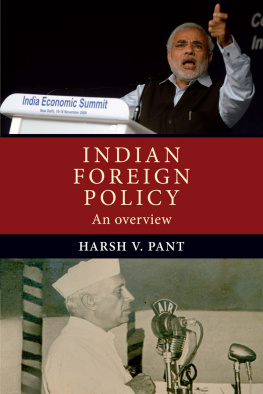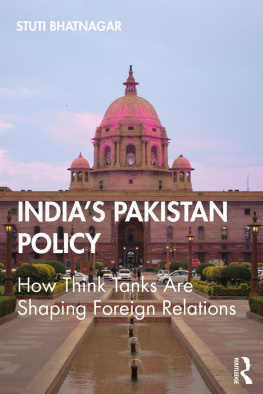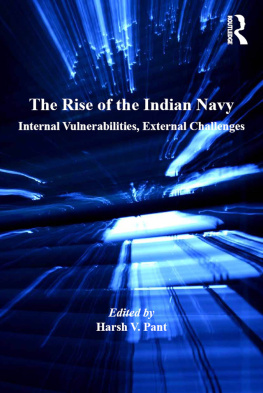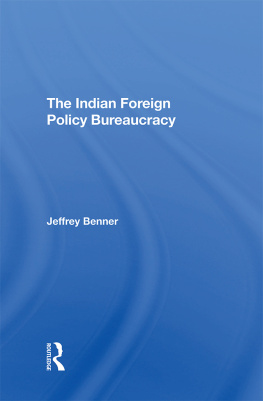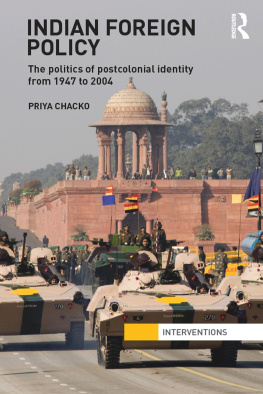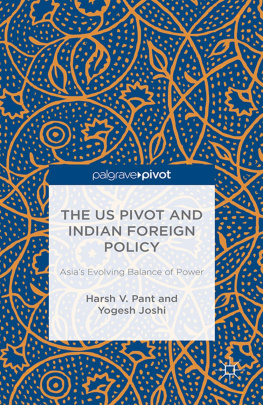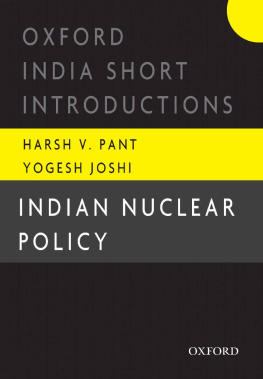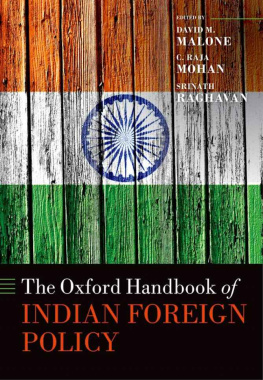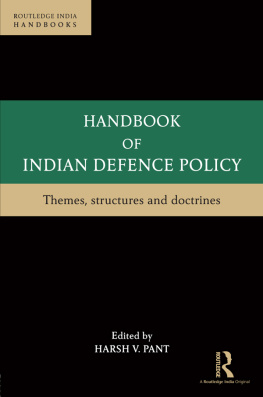Indian foreign policy
An overview
Harsh V. Pant
Manchester University Press
Copyright Harsh V. Pant 2016
The right of Harsh V. Pant to be identified as the author of this work has been asserted by him in accordance with the Copyright, Designs and Patents Act 1988.
Published by Manchester University Press
Altrincham Street, Manchester M1 7JA
www.manchesteruniversitypress.co.uk
British Library Cataloguing-in-Publication Data
A catalogue record for this book is available from the British Library
Library of Congress Cataloging-in-Publication Data applied for
ISBN 978 1 7849 9335 1 hardback
ISBN 978 1 7849 9336 8 paperback
First published 2016
The publisher has no responsibility for the persistence or accuracy of URLs for any external or third-party internet websites referred to in this book, and does not guarantee that any content on such websites is, or will remain, accurate or appropriate.
Typeset by Out of House Publishing
To the loving memory of Ija
Contents
Indian foreign policy has been rapidly evolving over the last two decades. As India has risen economically and militarily in recent years, its political clout on the global stage has also seen a commensurate increase. From the peripheries of international affairs, India is now at the center of major power politics. It is viewed as a major balancer in the Asia-Pacific, a major democracy that can be a major ally of the West in countering China even as India continues to challenge the West on a whole range of issues non-proliferation, global trade and climate change.
Indian foreign policy was largely driven by a sense of idealism since its independence in 1947. India viewed global norms as important as it kept a leash on the interests of great powers and gave New Delhi strategic autonomy to pursue its interests. But as India itself has emerged as a major global power, its foreign policy has moved towards greater strategic realism.
This book is an overview of Indian foreign policy as it has evolved in recent times. The focus of the book is on the 21st century with historical context provided as appropriate. It is an introductory book on Indian foreign policy and is not intended to be a detailed examination of any of its particular aspects. It examines Indias relationships with major powers, with its neighbors and other regions, as well as Indias stand on major global issues. With a gradual accretion in its powers, India has become more aggressive in the pursuit of its interests, thereby emerging as an important player in the shaping of the global order in the new millennium. Since all issues, regions, and countries cannot be covered in a single volume, small snapshots of important issues have been provided in each section.
This project has taken a few years to materialize and I am thankful to Manchester University Press and Orient BlackSwan for helping me in the process. A number of individuals helped me with various parts of the book. Special thanks to Frank ODonnell, Yogesh Joshi, Kundan Singh, and Deeksha Tewari for their assistance! My wife, Tuhina, and daughter, Vaidehi, remain very patient with me despite my occasional negligence. There is no way to fully acknowledge their roles nor would I want to try it. This book is dedicated to the memory of my grandmother, Ija, who passed away while I was working on this project. I will always cherish the time I got to spend with her and the sheer joie de vivre which she brought to my life and to everyone elses she managed to touch. For that and for everything else, I will always be grateful.
In November 2008, the financial capital of India, Mumbai, was struck by terrorists who the Indian (as well as the American and the British) intelligence later confirmed had received extensive training from the Pakistan-based group, Lashkar-e-Toiba, or Army of the Pure. Given the sophistication of planning and execution involved, it soon became apparent that this was a commando-style operation that possibly had the involvement of a state actor. As physical evidence mounted in terms of satellite phone calls, equipment and boats used for the attack, Pakistans hand was seen as smeared all over the operation. Though India conceded that probably the newly installed civilian administration in Islamabad of Asif Ali Zardari was not behind the attacks, the army and the Inter Services Intelligence (ISI) were seen as the main culprit.
The public outcry after the Mumbai attacks was strong enough for the Indian government to consider using the military option vis--vis Pakistan. But it soon turned out that India no longer had the capability of imposing quick and effective retribution on Pakistan and that it no longer enjoyed the kind of conventional superiority vis--vis its regional adversary that it had enjoyed for the past five decades. This was a surprising conclusion for a nation that the international community regarded as a major global economic and military power, pursuing a defense modernization program estimated to be over US$50 billion over the next five years.
A year earlier, in another incident that confounded observers, Indias Cabinet Secretary sent a note to all the ministers of his government advising them against attending a function organized by the Gandhi Peace Foundation on behalf of the Dalai Lama. For the Indian government, it seemed a tough balancing act but for the rest of the world it was a supine foreign policy posture by a state that wants to be recognized as an emerging great power.
These episodes are symptomatic of the fundamental crisis facing Indian foreign policy at the beginning of this new millennium. As Indias weight has grown in the international system in recent years, theres a perception that India is on the cusp of achieving great power status. It is repeated ad nauseam in the Indian and often in global media and India is already being asked to behave like one. There is just one problem: Indian policy-makers themselves are not clear as to what this status of a great power entails. At a time when the Indian foreign policy establishment should be vigorously debating the nature and scope of Indias engagement with the world, it is disappointingly silent. This intellectual vacuum has allowed Indian foreign policy to drift without any sense of direction and the result is that as the world is looking to India to shape the emerging international order, India has little to offer except some platitudinous rhetoric that does great disservice to Indias rising global stature.
As India makes its ascent in the global inter-state hierarchy, two issues have emerged as significant in defining its future trajectory. One, India will have to exploit the extant structure of international system to its advantage. Structural constraints are the most formidable ones a state encounters in its drive toward the status of a major power. Yet, Indian foreign policy continues to be reactive to the strategic environment and the constraints it imposes rather than trying to shape the strategic realities. While such an ad hoc response to the structural imperatives carried little cost when India was on the periphery of global politics, this can have grave consequences now when Indian capabilities have risen to a point where it seems poised to play a significant role in global politics. A second related constraint that India faces is its discomfort with the very notion of power and in particular its wariness of the use of hard power. All major powers throughout history have demonstrated an ability to skillfully use military as an effective instrument of national policy. Indias reluctance to evolve a more sophisticated understanding of power and of military power in particular will continue to underline the strategic diffidence that has come to be associated with Indian foreign and security policy.



